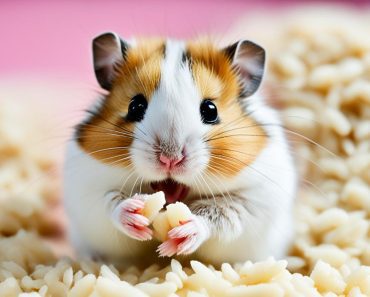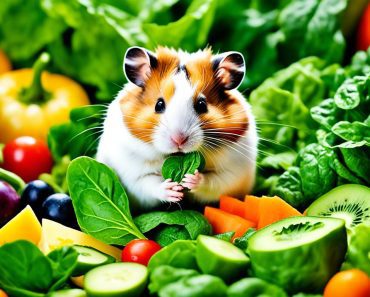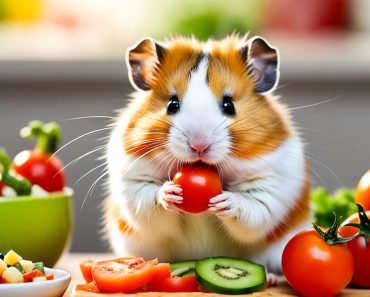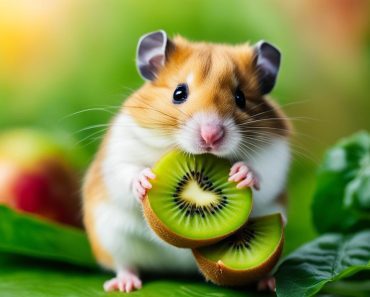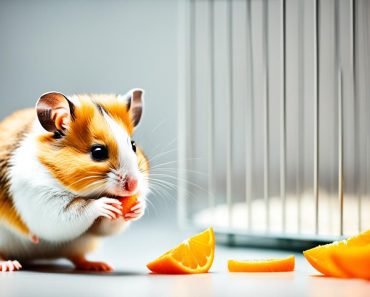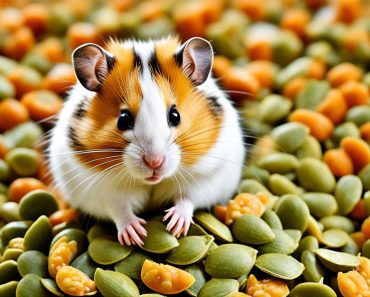As a hamster owner, you may wonder if it’s safe to feed your little furry friend meat. After all, hamsters are known to be herbivores, right? Well, that’s not entirely true. Hamsters are actually omnivores, which means they can eat both meat and plants. Understanding their dietary needs and making the right choices is essential for their health and well-being.
Hamsters have a diverse diet in the wild, consisting of grain, grasses, seeds, and even insects. While they do store food in their cheeks and eat a lot, it’s important not to overfeed them. Syrian and dwarf hamsters should be fed about 10 grams of hamster pellets twice per day or one tablespoon once per day. Pellets, seed mixes, and fresh foods can all be part of a hamster’s diet.
Can Hamsters Eat Meat? Yes, they can!
- Hamsters are omnivores and can eat both meat and plants.
- Syrian and dwarf hamsters should be fed about 10 grams of hamster pellets twice per day or one tablespoon once per day.
- A balanced diet for hamsters includes pellets, seed mixes, and fresh foods.
- Meat can be a healthy source of protein for hamsters, but it should be cooked and given in small portions.
- Consult a veterinarian specializing in small animals for specific questions or concerns regarding your hamster’s diet.
The Normal Hamster Diet
When it comes to feeding hamsters, it’s important to provide them with a diet that resembles what they would eat in the wild. Hamsters are naturally omnivorous and consume a variety of foods such as grains, grasses, seeds, and even insects. Their feeding habits involve storing food in their cheeks and eating small amounts throughout the day instead of having large meals.
For both Syrian and dwarf hamsters, a normal hamster diet consists of hamster pellets. It is recommended to feed them about 10 grams of hamster pellets twice per day or one tablespoon once per day. These pellets are specially formulated to provide the necessary nutrients for their overall health and well-being.
Overfeeding should be avoided as hamsters have a tendency to overeat and hoard food. This can lead to obesity and other health issues. It’s important to monitor their food intake and ensure they are getting the right amount of food to maintain a healthy weight.
Good Foods for Hamsters
When it comes to feeding your hamster, there are plenty of options to choose from. A well-rounded diet includes a variety of foods such as pellets, seed mixes, and fresh foods.
Pellets
Pellets are a great option for providing complete nutrition to your hamster. They are specially formulated to meet the dietary needs of hamsters and provide all the necessary vitamins and minerals. Pellets also have the advantage of not spoiling quickly, making them a convenient choice for busy pet owners.
Seed Mixes
Seed mixes can be a more exciting option for your hamster. They consist of a blend of different seeds, offering variety and enrichment to their diet. However, it’s important to note that hamsters may pick out their favorite seeds and leave the rest, potentially creating an imbalanced diet. To ensure a balanced intake, monitor your hamster’s seed consumption and supplement with other foods accordingly.
Fresh Foods
Fresh foods like greens, fruits, vegetables, and whole grains can be used as treats and supplements to your hamster’s diet. They provide additional nutrition and enrichment. However, it’s important to offer these foods in moderation to avoid overfeeding and ensure a balanced diet. Some safe options for hamsters include leafy greens like spinach and kale, small pieces of fruits such as apples and strawberries, and vegetables like carrots and cucumbers. Whole grains like cooked quinoa or oats can also be included in small amounts.
Remember to always introduce new foods gradually to your hamster’s diet to avoid digestive issues. It’s also important to wash fruits and vegetables thoroughly and remove any seeds or pits before feeding them to your furry friend.
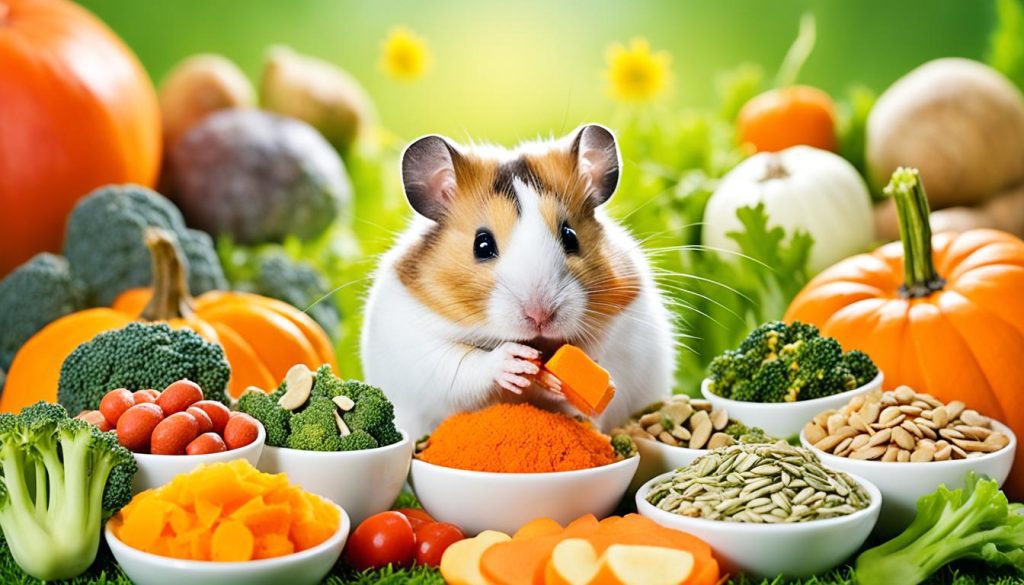
Offering a variety of foods is key to providing a balanced and nutritious diet for your hamster. The combination of pellets, seed mixes, and fresh foods ensures that your hamster receives all the necessary nutrients for optimal health. Remember to consult with a veterinarian specializing in small animals for specific dietary recommendations for your pet.
Can Hamsters Eat Meat?
Contrary to popular belief, hamsters are not strict herbivores. They need animal protein as part of their diet. Meat can be a healthy source of protein for hamsters.
When it comes to feeding hamsters meat, it’s important to make sure it is cooked and given in small portions. Cooked chicken and cooked beef are safe options. However, it’s crucial to avoid raw meat as it may contain harmful bacteria that can make hamsters sick.
Canned dog food can also be fed to hamsters as it contains a balanced blend of meat and other nutrients. However, it should only be given in small amounts and not as a substitute for their regular diet.
It’s important to note that seasonings, such as salt, spices, and other additives, should be avoided when feeding meat to hamsters. These can be harmful to their delicate digestive system.
Aside from traditional meat sources, hamsters can also obtain animal protein from low-fat hard cheeses and low-fat cottage cheese. These can be given as occasional treats or mixed into their regular diet.
To summarize, hamsters can eat meat as part of a balanced diet. Cooked chicken, cooked beef, canned dog food, and low-fat cheeses are suitable options. However, meat should be given in small portions and cooked thoroughly to ensure the safety and health of your hamster.
Can Hamsters Eat Turkey?
Yes, hamsters can safely eat turkey as part of their diet, but certain precautions must be taken. Turkey should always be properly cooked and served in minuscule portions to prevent choking. It’s essential to chop the turkey into small, manageable pieces that can be easily consumed by your hamster. Additionally, make sure the turkey is unsalted and unseasoned to avoid any potential harm to your furry friend.
When offering turkey to your hamster, keep in mind the small size of their stomach. It’s crucial to provide only tiny portions to prevent overfeeding. Remember, hamsters have specific dietary needs, and their primary source of nutrition should come from balanced hamster pellets, seed mixes, and other fresh foods.
Can Hamsters Eat Fruit or Vegetables?
Hamsters can enjoy a variety of fruits and vegetables as part of their diet. These tasty and nutritious treats provide essential vitamins, minerals, and fiber for your furry friend. When choosing fruits and vegetables for your hamster, it’s important to consider their safety and nutritional value.
Some safe fruits for hamsters include:
- Bananas
- Apples
- Strawberries
- Blueberries
These fruits should be cleaned, peeled, and cut into small, bite-sized pieces before offering them to your hamster. Remember not to overfeed fruits, as they can be high in sugar and too much can upset your hamster’s digestive system.
When it comes to vegetables, hamsters can enjoy:
- Peas
- Sweet potatoes
- Squash
Like fruits, vegetables should be cleaned and cut into small, manageable pieces. Fresh greens like lettuce, spinach, and kale should also be included in your hamster’s diet to provide essential nutrition and fiber.
Remember, moderation is key when introducing fruits and vegetables to your hamster’s diet. These treats should supplement their primary diet of hamster pellets and seed mixes, not replace them. If you have any concerns about your hamster’s diet or specific fruits and vegetables, consult a veterinarian specializing in small animals for expert advice.
Other Human Foods That Are Safe for Hamsters
In addition to meat, fruits, and vegetables, there are other human foods that are safe for hamsters. These foods can make great treats for your furry friend, adding variety to their diet and providing them with additional nutrients.
Apples
Apples are a delicious and healthy snack for hamsters. They are rich in vitamins and fiber, promoting good digestion and overall well-being. Just remember to remove the seeds and core before feeding them to your hamster.
Bananas
Bananas are another safe and tasty treat that hamsters love. They are a good source of potassium and Vitamin C, which are essential for your hamster’s immune system. Slice the banana into small pieces to make it easier for your hamster to eat.
Blueberries
Blueberries are packed with antioxidants and can provide your hamster with a sweet and nutritious treat. They are low in calories and high in fiber, making them a healthy snack option. Offer a few blueberries to your hamster occasionally as a special treat.
When feeding these foods to your hamster, it’s important to remember to give them in small amounts. Hamsters have small stomachs, and overfeeding can lead to digestive issues. These treats should be given sparingly and as part of a balanced diet.
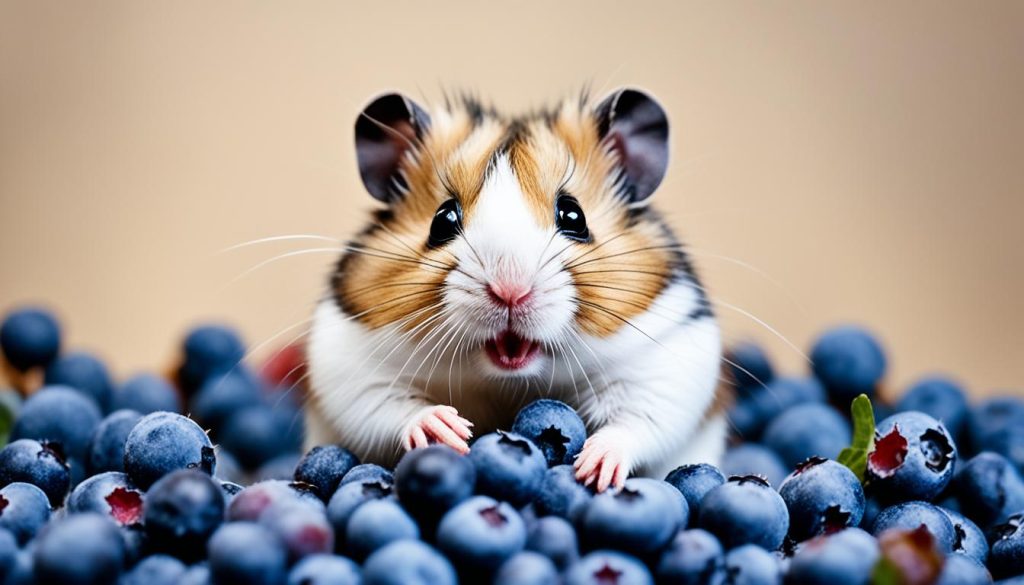
By offering a variety of safe human foods, such as apples, bananas, and blueberries, you can provide your hamster with a diverse and enjoyable diet. Just remember to always remove any seeds, cores, or skins that may be harmful to your hamster’s health.
Conclusion
Providing a balanced and nutritious diet is essential for the health and well-being of hamsters. As omnivores, hamsters require a combination of meat, pellets, seed mixes, and fresh foods to meet their dietary needs. While hamsters can eat meat, it is important to ensure it is properly cooked and given in small portions to prevent any digestive issues. Consulting a veterinarian specializing in small animals can provide valuable guidance and address any specific questions or concerns about feeding hamsters.
By offering a variety of safe foods, hamster owners can ensure their pets receive proper nutrition and thrive. It is recommended to include hamster pellets as the foundation of their diet, providing complete and balanced nutrition. Seed mixes can add variety and enrichment, but it is important to monitor the amount consumed as hamsters may pick out their favorite seeds. Fresh foods like vegetables and fruits can be used as treats or supplements, but it’s crucial to remember not to overfeed high-sugar fruits and to clean, peel, and cut them into small pieces for easy digestion.
Remember, a well-fed hamster is a healthy and happy hamster. By understanding their dietary needs and offering a diverse and balanced diet, hamster owners can ensure their furry companions lead a long and vibrant life.

